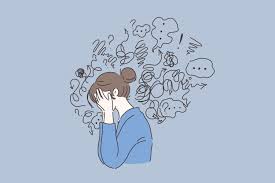Anxiety and Depression: Understanding the Silent Struggles
Anxiety and depression are two of the most common mental health disorders that affect millions of people worldwide. While they are distinct conditions, they often coexist and share similar symptoms that can significantly impact a person’s daily life.
Anxiety:
Anxiety is characterized by feelings of worry, fear, or unease that can be intense and persistent. It can manifest in various forms, such as generalized anxiety disorder, social anxiety disorder, panic disorder, or specific phobias. People with anxiety may experience physical symptoms like rapid heartbeat, sweating, trembling, and difficulty breathing.
Living with anxiety can be exhausting as it often leads to overthinking, excessive worrying about future events, and avoidance of certain situations that trigger anxiety. Without proper management, anxiety can interfere with work, relationships, and overall well-being.
Depression:
Depression is a mood disorder characterized by persistent feelings of sadness, hopelessness, and loss of interest in activities that were once enjoyable. It goes beyond temporary feelings of sadness and can significantly impair a person’s ability to function in daily life. Symptoms of depression include changes in appetite or weight, sleep disturbances, fatigue, feelings of guilt or worthlessness, and thoughts of death or suicide.
Individuals living with depression may struggle to find motivation to engage in activities they once enjoyed. They may also experience difficulties concentrating at work or school and have strained relationships with family and friends due to their emotional state.
Seeking Help:
It is essential for individuals experiencing symptoms of anxiety or depression to seek help from mental health professionals. Therapy, medication, lifestyle changes, and support from loved ones can all play a crucial role in managing these conditions effectively.
Remember that mental health is just as important as physical health. If you or someone you know is struggling with anxiety or depression, reach out for help. You are not alone in your struggles, and there are resources available to support you on your journey toward healing.
Top 7 FAQs About Understanding and Managing Anxiety and Depression
- What are 5 coping skills for anxiety?
- What is the best treatment for depression and anxiety?
- Is depression a side effect of anxiety?
- How does anxiety play a role in depression?
- What does anxiety and depression feel like?
- Can you have anxiety and depression together?
- How to fight anxiety and depression?
What are 5 coping skills for anxiety?
When dealing with anxiety, it is essential to have effective coping skills to manage and alleviate symptoms. Five coping skills for anxiety include deep breathing exercises to promote relaxation, practicing mindfulness techniques to stay present and grounded, engaging in physical exercise to release tension and boost endorphins, using positive self-talk to challenge negative thoughts, and seeking support from a therapist or support group to gain valuable insights and coping strategies. By incorporating these coping skills into daily routines, individuals can better navigate moments of anxiety and enhance their overall well-being.
What is the best treatment for depression and anxiety?
When it comes to treating depression and anxiety, the best approach often involves a combination of therapies tailored to the individual’s specific needs. Cognitive-behavioral therapy (CBT) is widely recognized as an effective treatment for both conditions, helping individuals identify and change negative thought patterns and behaviors. In some cases, medication such as antidepressants or anti-anxiety medications may be prescribed by a healthcare provider to help manage symptoms. Additionally, lifestyle modifications such as regular exercise, healthy diet, adequate sleep, and stress management techniques can also play a significant role in improving mental well-being. It is crucial for individuals to work closely with mental health professionals to develop a comprehensive treatment plan that addresses their unique circumstances and promotes long-term recovery.
Is depression a side effect of anxiety?
The relationship between anxiety and depression is complex, and while they are separate conditions, they often coexist and can influence each other. Anxiety can sometimes lead to or exacerbate symptoms of depression. The persistent feelings of worry, fear, and unease associated with anxiety can take a toll on a person’s mental health over time, potentially contributing to the development of depressive symptoms. Additionally, the chronic stress and emotional strain caused by anxiety can impact neurotransmitter levels in the brain, which may also play a role in the onset of depression. It is important to recognize the interconnected nature of these mental health disorders and seek appropriate support and treatment to address both anxiety and depression effectively.
How does anxiety play a role in depression?
Anxiety often plays a significant role in the development and exacerbation of depression. When individuals experience chronic anxiety, it can lead to a constant state of stress and worry, which can wear down their mental and emotional resilience over time. This persistent anxiety can contribute to feelings of hopelessness, helplessness, and low self-esteem, all of which are common characteristics of depression. Additionally, the physical symptoms associated with anxiety, such as fatigue and sleep disturbances, can further impact mood and overall well-being, potentially triggering or intensifying depressive episodes. Therefore, addressing anxiety is crucial in managing and preventing depression, as the two conditions often coexist and influence each other in complex ways.
What does anxiety and depression feel like?
Experiencing anxiety and depression can feel like being trapped in a constant state of fear, worry, and sadness. Anxiety may manifest as a racing heart, sweaty palms, and a sense of impending doom, making even simple tasks feel overwhelming. On the other hand, depression can feel like a heavy weight on your chest, draining your energy and joy for life. It’s like navigating through a fog of negative thoughts and emotions that cloud your perception of reality. Both conditions can leave you feeling isolated, misunderstood, and struggling to find relief from the emotional turmoil within.
Can you have anxiety and depression together?
It is common for individuals to experience both anxiety and depression simultaneously. These two mental health conditions often coexist and can exacerbate each other’s symptoms. Having anxiety and depression together can create a complex emotional landscape where feelings of worry, fear, sadness, and hopelessness intertwine. It is important to recognize the overlapping nature of these disorders and seek appropriate support and treatment to address both conditions effectively. Consulting with mental health professionals can help individuals navigate the challenges of managing anxiety and depression concurrently, leading to improved well-being and quality of life.
How to fight anxiety and depression?
When it comes to combating anxiety and depression, it’s important to take a multi-faceted approach that addresses both the physical and emotional aspects of these conditions. Seeking professional help from therapists, counselors, or psychiatrists can provide valuable guidance and support in developing coping strategies and treatment plans tailored to individual needs. In addition to therapy, incorporating healthy lifestyle habits such as regular exercise, balanced nutrition, sufficient sleep, and stress management techniques can help alleviate symptoms of anxiety and depression. Building a strong support system of friends, family members, or support groups can also offer emotional reassurance and encouragement during challenging times. Remember that recovery is a journey, and with patience, self-care, and persistence, it is possible to navigate through the difficulties of anxiety and depression towards a path of healing and well-being.




